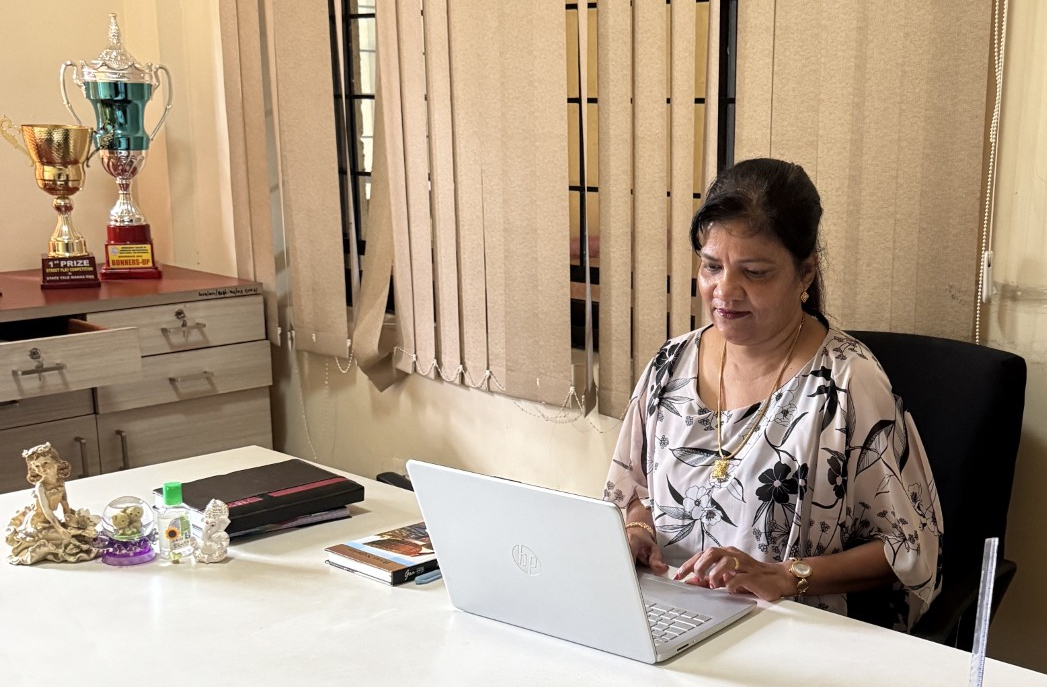GLOBAL GOENKARS IN FOCUS

When Goan Catholic couples migrate to the United Kingdom, they carry more than suitcases; they carry dreams, faith, and the vows that once bound them in Goa’s quiet churches.
But what happens to those vows when one partner holds a Portuguese passport and the other still carries an Indian one?
Over the last few years, I observed that many families were thriving financially abroad, yet struggling emotionally. I wanted to understand why and how.
These questions inspired my study, ‘Across Borders, Between Vows: Marital Challenges of Transnational Goan Catholic Couples Under Differentiated Passport Status in the United Kingdom’, which examines how migration and citizenship differences quietly reshape marriages within the Goan diaspora.
This study was conducted as part of my post-doctoral sabbatical while based in the United Kingdom, where I got to closely engage with the Goan diaspora community and gather first-hand data.
I recently got the opportunity to present my research at the 8th International Conference on Gender and Sexuality 2025, organised by the International Institute of Knowledge Management in Bangkok-Thailand, on October 21-22.
THE IMPORTANCE
Migration has long been seen as a pathway to prosperity. For Goan Catholics, Portuguese citizenship by descent has opened doors to the UK’s job market and social systems.
But as I listened to stories from returning migrants and then as I lived in the UK, I noticed another side of this success story: emotional distance between couples, rising gender tensions, and a slow fading of shared spiritual life.
I decided to explore these changes sociologically, looking not just at what migration brings but also at what it takes away.
THE METHODOLOGY
The study was based on both numbers and narratives. Nearly 700 Goan Catholic couples living in London, Leicester, Wembley, Southall, Hounslow, Croydon, Bridgewater and Swindon took part in the study.
I distributed structured questionnaires and also conducted interviews and detailed case studies. I also interviewed people during Goa Day functions in London as well as Swindon.
The term I used, ‘Differentiated Passport Status’ (DPS), describes couples where one spouse has a Portuguese or British passport while the other remains on an Indian passport.
This difference, though bureaucratic on paper, often translates into unequal emotional, social, and even spiritual experiences.
Many participants were reached through parish networks, Goan social associations, and community groups. Beyond the statistics, their life stories revealed a deeper emotional landscape of hope, stress, adaptation, and love tested by distance and duty.
THE FINDINGS
The findings painted a complex picture. While migration improved economic stability, it also strained family bonds.
* Couples with different passport statuses faced longer separations, visa hurdles, and uneven access to jobs and housing.
* Working hours were long, and many spouses clocked over 40 hours a week, leaving little time for family or prayer.
* Gender roles reversed: Women often became the primary earners in the UK’s care sector, while men struggled to redefine their roles.
One woman told me she felt “like a guest” in her own marriage until her visa arrived. Another husband said, “My wife earns more than I do now, but I feel I’m losing my role as the head of the family.”
These experiences show how migration doesn’t just move people; it transforms the very fabric of relationships.
THE CHALLENGES
Financial management was the most common cause of misunderstanding, followed by childcare and fatigue from dual jobs. Many admitted they now had less time to pray together or participate in church activities, though individual faith remained strong.
Essentially, migration gave couples economic wings but clipped their emotional togetherness. The warmth of community life in Goa, where family and faith provided structure, has been replaced by individual schedules and financial pressure in the UK.
THE BALANCE
Yet, the story isn’t just one of struggle; it’s also about resilience. Couples who consciously preserved family rituals, prayer time, and community engagement reported stronger relationships. Goan associations and parish groups in the UK can play an important role by offering emotional and spiritual support to these transnational families.
The study reminds us that while passports can divide, faith and dialogue can reconnect. Marriage, after all, is not only about legal documents; it’s about understanding, adjustment, and shared values that survive borders.
THE REFLECTION
Migration has undoubtedly uplifted Goan families economically. But it has also challenged the traditional Catholic understanding of marriage as a lifelong covenant. My research found that when one partner holds more legal or economic power, the relationship often becomes a negotiation rather than a covenant.
In the end, love across borders requires more than visas; it needs communication, shared faith, and quality time together. These are the real bridges that help couples stay united, even when their passports and their worlds differ.
‘Across Borders, Between Vows’ shows that while migration offers opportunity, it also calls for emotional adaptation. Love may cross oceans, but it must also learn to navigate the tides of change.
THE ACKNOWLEDGEMENT
I would like to express my heartfelt thanks to my college principal, Dr Pravina Kerkar, and to the Directorate of Higher Education (DHE), Under Secretary Prasad Lolayekar, and my ex-principal and former DHE director, Professor Bhaskar Nayak, for their constant encouragement and support during my academic journey.
My sincere gratitude also goes to Chief Minister of Goa Pramod Sawant and former chief minister Churchill Alemao for their invaluable support and goodwill.
I extend my warm appreciation to the staff of the Directorate of Higher Education, my college administrative staff, and all my colleagues who stood by me throughout my studies.
I am also deeply thankful to the Goan community in the UK for their encouragement, Flavio Gracias, Chair of Trustees at Goan Welfare Society UK, and last but not least, Dr Daniel Adayi from the University of Lisbon, whose guidance and insights greatly enriched my research.
[The writer is an Associate Professor of Sociology, Government College of Arts, Science and Commerce, Quepem, Goa.]